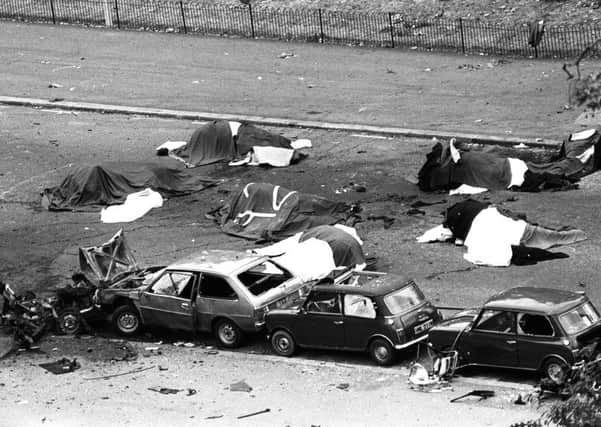Ben Lowry: Troubles legacy probes imbalance is one of the biggest scandals in Britain since World War II


When the Secretary of State James Brokenshire said the same, there was tidal wave of fury directed towards him.
But there has been a recent legacy imbalance. Indeed, it is one of the biggest scandals in Britain since the Second World War.
Advertisement
Hide AdAdvertisement
Hide AdThat might sound like hyperbole but it isn’t. After all, the Troubles was one of the biggest political and social challenges the UK faced after 1945. London was thrown into dealing with the situation at the end of the 1960s, and after some stumbles it began to find its feet.
Over more than three decades governments, Labour and Tory, saw off terrorism with patience and restraint. Now, almost unbelievably, the apparatus of the state appears to have turned in against the record of the state, despite that past success.
During the Troubles the largest paramilitary group, the IRA, was gradually outwitted. Its political wing began contesting elections in the early 1980s but never came close to overhauling the constitutional nationalist party, the SDLP, which remained unwavering in its opposition to violence.
From the late 1970s life in Northern Ireland slowly returned to normal from the worst days of the early 70s.
Advertisement
Hide AdAdvertisement
Hide AdBy the 1980s, many more people died on the roads each year than in conflict.
By the 1990s, an increasingly desperate IRA was having to target people who supplied the security forces, and was blowing up London to get what it had no chance of achieving at the ballot box.
For most of the Troubles, loyalist terrorists had useless intelligence and so killed many Catholic civilians.
All the while, the rule of law was upheld and known terrorists were acquitted by courts because their guilt could not be proven to the criminal standard.
Advertisement
Hide AdAdvertisement
Hide AdAfter all that restraint, we now spend more public money investigating alleged state than terrorist wrongdoing.
Here are some areas of legacy that are disproportionately focussed on the state:
1. Legal aid for numerous legal cases against the security forces in relation to Troubles allegations.
2. Police Ombudsman inquiries into historic allegations against the RUC. A judge ruled in March that the body needed more money, and was being impeded by underfunding.
Advertisement
Hide AdAdvertisement
Hide Ad3. Legacy inquests. We report today on how most of these 94 deaths happened at the hands of the state, including legitimate actions such as eight IRA men stopped by the SAS at Loughgall in 1987. More than a third of the inquest dead were terrorists.
4. Legacy directions by the Public Prosecution Service. A News Letter analysis in February found that six out of nine cases in which the PPS had ordered police to investigate legacy allegations were focussed directly on the state, and another three relate to the IRA informer Stakeknife. Thus at least two-thirds of the nine legacy cases relate to potential wrongdoing by the state. The other three, Stakeknife, are significantly but not wholly focused on the state. The politician Trevor Ringland believes the Stakeknife probe should focus on identifying IRA leaders.
5. The PSNI legacy branch. It was reported in February that investigations into security force killings account for about 30% of its legacy workload. Given that the state was responsible for 10% of the deaths, most of them legitimate, this is a big imbalance.
Not one of these areas above has a counterpart that is focused on terrorists.
Advertisement
Hide AdAdvertisement
Hide AdThis heavy scrutiny of the state has all happened in the aftermath of the furtive On The Runs scheme to help the IRA, after the UK failure to push for damages for Libya-IRA victims and after legal aid was refused to Hyde Park families when the state failed to pursue their IRA killers.
It is also happening against a backdrop in which prosecutors have re-instated an attempted murder charge against Dennis Hutchings and are considering possible murder charges against the Bloody Sunday soldiers.
Can we be surprised that there are no charges against the terrorist godfathers when so much money is being spent on investigating state forces?
However, we are in an election campaign. Candidates can now set out how they will rectify this scandal.
Advertisement
Hide AdAdvertisement
Hide AdThe government will soon publish its proposals for legacy bodies such as the Historical Investigations Unit – a chance to tell the public how the imbalance might end.
If a Conservative government with a large majority is elected on June 8, then it should commence an audit of all legacy expenditure, including legal aid, spent investigating the state over the last decade. It should also project costs, pro rata to victims, of the coming legacy structures.
Then instead of responding meekly when there is uproar at any reference to the legacy imbalance, Mr Brokenshire or any successor will be able to cite the statistics.
And then move on to rectify it.
• Ben Lowry (@BenLowry2) is News Letter deputy editor